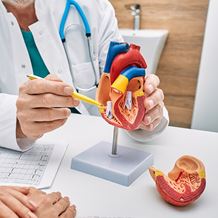What is a Electrocardiogram (ECG)?
An electrocardiogram (ECG) is a test that uses a special machine to measure the electrical activity in your heart. Sometimes referred to as an EKG, this non-invasive procedure records the electrical pulse that is released every time your heart beats. It can help to identify whether there is any abnormality in your heart rhythm (arrythmia), or any heart condition such as coronary artery disease that is impacting how well your heart functions and the electrical activity in your heart.
How does it work?
Electrodes and wires are attached to your chest and arms using small sticky dots which trace and record the electrical activity in the heart. The ECG trace looks just like a series of spikes, and they can tell us exactly what is happening in your heart at a particular moment in time. The results are interpreted by specially trained doctors who will diagnose what may be causing the change in behaviour and can determine what treatment may be necessary.
There are three types of ECG available, and your doctor will discuss with you which one is appropriate for your condition:
- Resting ECG – Your heart activity is recorded for 5-10 minutes while you lie still. There is no particular preparation required.
- Ambulatory ECG (Holter monitor) – A special monitor records your heart activity while you move around for a specific period of time. This is helpful if symptoms are unpredictable.
- Heart stress test – The ECG records how your heart behaves during physical activity. This might take place on a running machine or exercise bike and can take up to 30 minutes to complete.
Why do I need it?
Your doctor may recommend an ECG if you have been experiencing any symptoms that suggest there is a problem with your heart. Symptoms include:
- Chest pain or heart attack symptoms
- Dizziness
- Fainting
- Fatigue
- Heart fluttering
- Shortness of breath
- Nausea
- Sweating
What does a Heart stress test show?
ECG testing is useful for diagnosing problems that affect your heart health. These may include:
- Arrythmias – an ECG can help diagnose if your heart rate is irregular (atrial fibrillation), or running too fast (tachycardia) or too slow (bradycardia)
- Heart damage – There may be evidence of a previous or current heart attack
- Blood flow – Any condition that impacts how well the blood flows in and out of your heart, such as pulmonary hypertension
- Structural changes – These may include inflammation or a change in heart shape
If your ECG results are normal, your doctor will talk to you about any further testing that may be required such as an echocardiogram, angiogram or chest X-ray. If your results indicate a particular heart condition, your doctor may recommend further testing to confirm the condition and the best treatment pathway to suit your needs.
What's next?
If you have been experiencing heart-related symptoms, book an appointment with our cardiac services specialist today.
Our specialists in Cardiac Services
View all specialists






